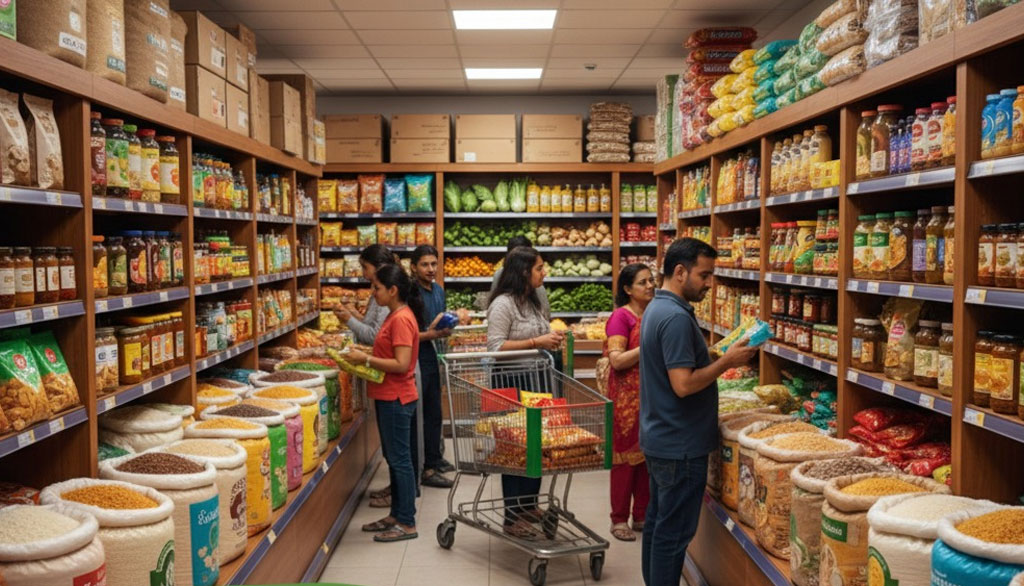
The smell of freshly milled spices, the inviting sight of lentils in a rainbow of colors, and the familiar logos of popular brands from home, walking into an Indian grocery store is often a taste of home for many households. Not all Indian grocery stores are created equal, and finding the right one can make a big difference in the quality of meals made and in the health of your finances.
Knowing where the indian grocery store closest to me makes a difference; closer locations often count more than people consider. I have previously noted that items like curry leaves, drumsticks and bitter gourd quickly lose potency. Food safety experts suggest fresh vegetables retain their quality when consumed days after purchase. A store nearby enables shoppers to visit frequently and best preserves the ingredient goodies.
Distance of food purchasing matters too. If someone lives near an indian grocery store in concord nc, or similar options nearby, they will often find themselves cooking authentic meals because a quick trip to grab fresh coriander or a missing ingredient does not mean an hour drive. Convenience makes cooking a regular part of life rather than a sporadic existence!
Entering any grocery store, even before stepping foot onto the floor tells a story. The floor, organizational components, even temperature—will tell you how serious the owner is about their business. Fruits and vegetables should look fresh and crisp, not droopy or dried out. Refrigerated sections should be refrigerated, especially with items such as paneer, yogurt, and frozen parathas.
When it comes to storage, health professionals say, it’s important to store food properly to prevent bacterial growth and preserve health value. Wise grocery shoppers even check the expiration dates on spirit, flour, and packaged food. Ground turmeric powder, for example, can lose the curcumin properties associated with health benefits if it has been on the shelf too long.
First-time shoppers are usually overwhelmed by the sheer volume of options available. When you are new to the point of what to buy at an indian grocery store, it helps to know the basics. Basmati rice is the backbone of countless dishes. Protein-rich legumes and lentils—such as toor dal, moong dal, or masoor dal—are available. Whole spice—cumin seeds, mustard seeds, and cardamom pods—provide more robust flavor than pre-ground spices.
Nutrition experts say that whole grains and legumes in ethnic stores are often less expensive than in traditional supermarkets, and better quality. It is a sound way to buy, especially for families who regularly prepare meals.
The produce section typically has staples like ginger, garlic, green chilies, and seasonal produce—okra and eggplant are typical items. Frozen options usually stocked in the frozen section can be bought over fresh ones, yet fresh will always win in flavor and nutrition.
Discount-savvy shoppers have become wise to the idea that the lowest price is not always the best value. A five-pound bag of old, broken rice is much cheaper than premium aged basmati rice, but the experience of cooking with it will be different. The grains will not separate properly, and there will be no aroma.
It is smart to consider the price across stores, but the comparison across similar qualities is even more important. Some Indian grocery location in concord might be a little more expensive than a big warehouse store far away, but the savings in time and fuel probably level that off. The other dense to smaller stores is the personal interaction with an owner who remembers your likes and dislikes, or suggests recipes or sets aside special items for you.
Buying in bulk is valuable when dealing with products that are not perishables. Buying a twenty-pound bag of flour or a large container of ghee enables one to obtain a good price per unit. But, for anything susceptible to going rancid, like nuts or ground spices, it definitely backfires!
There is always a person behind a successful shop who has deep roots in the community. They carry local specialties because customers want those products. They offer organic produce whenever possible, and they patiently answer questions about unfamiliar vegetables, sharing their own recipes.
For those searching for an indian grocery store concord area or otherwise, a quick call before you go will save a trip and frustration. The good store has established a relationship with their customers, and will order specific items if it is a common item for a regular customer.
A family recently stumbled upon Triveni Supermarket in its quest for authentic ingredients to fit their restaurant menu. Consistency in quality was important to the owners—the same quality cardamom every week, suppliers they could count on for fresh fenugreek, and competitive prices that make it easy to keep a sustainable business. A grocery run for the family turned into a partnership. The store owners understood restaurant needs, supplying food in bulk with deliveries that met their schedule. More importantly, they demonstrated the same commitment to quality as the restaurant valued. This relationship demonstrates how the right grocery connection elevates not just cooking at home, but kitchens as well.
In conclusion, deciding which store has the best groceries is a matter of balancing quality, pricing, ease and a certain sense of trust that can be hard to pinpoint. For one person, the nearby indian grocery store could well be the best while right down the street is yet another's worst choice. Your personal preferences - whether that's organic, regional specific, or type of budget - undoubtedly influence your choice.
The people who love grocery shopping the most all visit more than one store at first to examine their available stock, compare prices, general clientel, and consider their customer experience. They develop a rapport with the employees, ask questions, and experiment with new products. As a result, grocery shopping becomes less of a task, rather to a relevant experience that feeds our bodies and souls and helps keep culinary traditions going through generations.
https://www.nhlbi.nih.gov/health/heart-healthy-living/children